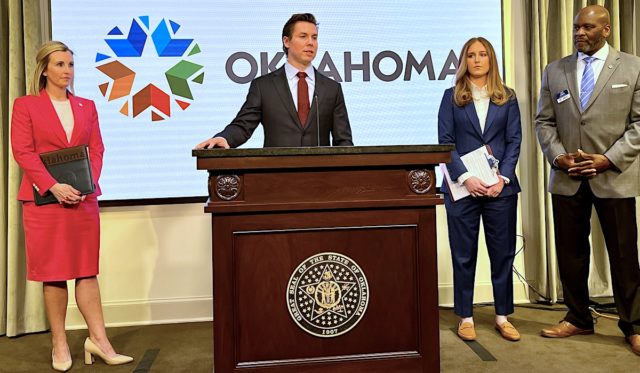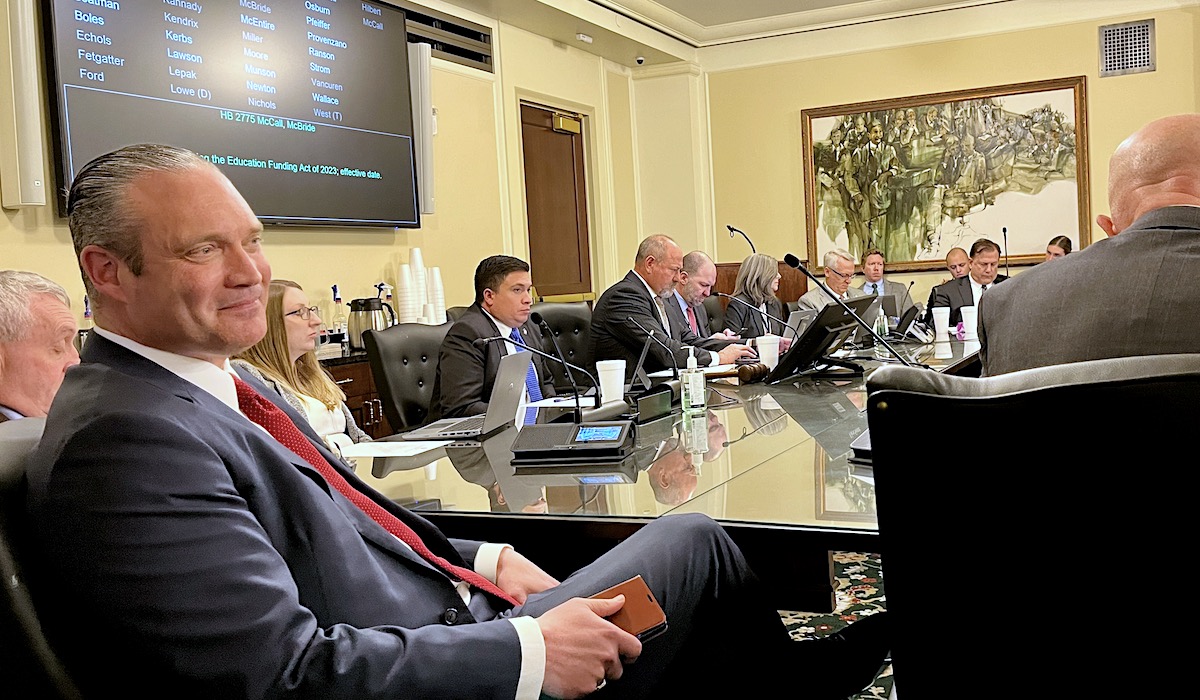

For the second time in as many years, the Senate Education Committee’s chairman and other lawmakers are trying to pass a paid maternity leave bill for teachers.
Part of Sen. Adam Pugh’s education agenda, SB 364 would require districts to provide 12 weeks of paid maternity leave for teachers, the bill and Pugh’s education agenda come as the House has already passed its own education plan that does not include a maternity leave requirement for teachers.
“I honestly can’t think of a more pro-life thing that we can do in this body than support moms who just had a baby,” Pugh (R-Edmond) said in a committee hearing Feb. 14. “When I start to look at what most civilized nations around the world are doing, they’re doing significantly more than 12 weeks.”
If passed, the legislation would put Oklahoma ahead of many other states regarding teacher benefits.
While teachers qualify for the Family and Medical Leave Act, a national law passed by Congress in 1993 that requires employers to provide employees with up to 12 weeks of unpaid, job-protected leave per year, only 13 states and the District of Columbia have paid parental leave laws, according to the Bipartisan Policy Center, a Washington, D.C., think tank. Oklahoma is not one of those states currently.
For teachers specifically, an Education Week article from August indicates that only a “handful” of states provide paid maternity leave for teachers.
Of the states that border Oklahoma, only Missouri and Colorado have paid parental leave laws for teachers. Arkansas, Kansas and New Mexico governors have all signed executive orders providing parental leave to employees of state agencies, but those orders do not apply to teachers.
Texas does not have a statewide law granting paid parental leave to public school educators.
Fiscal impact difficult to estimate
While SB 364 seems to have bipartisan support, questions remain about what the potential new law would cost the state and its school districts. When Pugh announced his filing of the bill, he estimated its cost to be $25 million. However, Senate fiscal staff wrote in their analysis of the bill that a lack of relevant data from the Oklahoma State Department of Education left them unable to determine the financial impact of the bill if the Legislature passes it.
“OSDE has determined that there will be a cost to implement this bill, but it is difficult to estimate the fiscal impact at this time,” Senate fiscal staffers wrote. “OSDE does not know the number of eligible school district employees and the compensation for these eligible employees that is needed to calculate the fiscal impact. Additionally, OSDE is also concerned that it may have to allocate funds from the support of public-school activities line item to fully fund the paid maternity leave.”
In the Feb. 14 Senate Education Committee meeting, Pugh said he will “fight like heck” to secure funding for the bill. Pugh said that while he could have advanced his paid maternity leave bill last year, he pulled it from consideration after he realized he could not secure funding for it in the Fiscal Year 2023 budget.
“I’m going to fight to fund this as hard as I possibly can because I believe in it that much,” Pugh said in the hearing. “I don’t want to create an unfunded mandate through this program and take something that could be really good for teachers and just turn it into a burden and a stress for the school districts.”
The bill’s language requires the state to appropriate funds to OSDE specifically for the mandate. If the Legislature does not do so, the bill as it currently reads would require OSDE to pick up the cost from its public-school activities fund.
Senate President Pro Tempore Greg Treat (R-OKC) said that while lawmakers do not know the exact estimated fiscal impact, they are using a $25 million estimation as a “placeholder” as they craft the Fiscal Year 2024 budget.
“We know it’s not going to be cheap, but it’s a good policy, and it’s one we’re trying to pursue,” Treat said.
Treat also said lawmakers are trying to get “better numbers” on the cost of the bill.
“When you do budgeting, you typically want to get the big rocks in place first,” Treat said. “And then you start arguing about the parts to fill in between the big rocks.”
No maternity leave in House education plan

As the Senate attempts to determine the full cost of its big rocks and paid teacher maternity leave, the House has already advanced a set of boulders that could increase the state’s education appropriation by $500 million and create a new tax credit for private school and homeschool families with a potential cost of $300 million.
House Speaker Charles McCall (R-Atoka) announced the House Republicans’ plan in a press conference Feb. 16. Representatives advanced the two laws, HB 2775 and HB 1935, off of the House floor Feb. 22. The bills have not been heard in the Senate yet.
HB 2775, which would increase the state’s education budget by $500 million, would grant districts money specifically for a teacher pay raise and an additional appropriation for “basically (…) anything in the academic realm,” according to McCall.
HB 1935 would give parents refundable tax credits if they send their kids to private school or homeschool them. McCall estimated that it could cost the state up to $300 million in revenue.
Asked during his Feb. 16 press conference about Pugh’s teacher maternity leave bill, McCall called it “a good piece of legislation” and said he is supportive of the concept.
“I provide it in my business every day, so I completely understand it,” said McCall, the CEO and board chairman of AmeriState Bank. “At the end of the day, the House and the Senate will coalesce around all of these things that we want to accomplish this session. I fully have the utmost admiration and respect for Sen. Pugh and all his colleagues. But, yes, that’s why communication is important during the session.”
‘Good common sense’

While supportive of the concept, some education administrators also worry about the logistics of providing 12 weeks of leave to their teachers.
April Grace, the superintendent of Shawnee Public Schools and a 2022 Republican candidate for state superintendent of public instruction, said that her district already provides ways for teachers to take up to 12 weeks of paid maternity leave, but that most take six or eight weeks, depending on a doctor’s advice.
Grace said it is “hard to say” how much a maternity leave law is needed in the state, and she said she is worried about who would pay for such a mandate from the Legislature.
Additionally, Grace said her biggest concern if the law passes would be finding long-term substitutes to ensure teachers can take advantage of the leave time.
“What I really worry about is how do we cover classrooms,” Grace said. “Because covering classrooms right now is a tough deal. That doesn’t mean that we shouldn’t honor someone that has a new child. That just means that there are many, many questions that this imposes.”
Grace emphasized that 12 weeks takes up a large part of a school year.
“If you think about 12 weeks — three months — of a school year, there’s a pretty substantial gap of instruction that can occur, and my concern would be how do we cover that?” Grace said. “(I am) not saying we shouldn’t all come to the table to try to figure it out, but those are just practical, operational questions that any superintendent can ask.”
Another 2022 candidate for state superintendent, Democrat Jena Nelson, voiced support for the bill.
“It makes good common sense to me to offer that so that they feel that not only can they have children (…) but that they’re going to have a place to come back to that they can continue their passion for teaching,” said Nelson, who is a former state teacher of the year from Oklahoma City.
State Superintendent of Public Instruction Ryan Walters’ spokesperson did not respond to a request for comment about SB 364.
Macomb Public Schools Superintendent Matt Riggs called the bill a positive idea despite the unanswered questions surrounding it.
“If you have a teacher that is starting a family and is in your community, then your district being able to offer that to support them in that decision may keep them in your district — keep them in the community long term,” Riggs said. “So, I don’t see it as a negative at all.”
Riggs expanded on his support with an example from his district.
“I currently have a teacher that was full-time and is starting a family. Because of childcare, (she) couldn’t do full-time, and we work with her to be part-time,” Riggs said. “And she’s actually right now on maternity leave, and you know, we want to do whatever we can to keep her. And so, the flexibility this would give us would be great.”
Asked how he views the concerns about the potential law’s fiscal impact, Riggs emphasized the good it would do for families.
“Well, I think if you do something, and the mistake you make is for supporting families and supporting people making those decisions, then that’s a mistake you can live with,” Riggs said. “We’ve made a lot of other mistakes that we don’t take into account people.”
SB 364 advanced out of the Senate Education Committee Feb. 14 with zero nay votes. It also advanced out of the Senate Appropriations and Budget Committee on Feb. 22 with zero nay votes. It will need to be heard on the Senate floor by the March 23 deadline for measures to advance out of their chamber of origin.




















